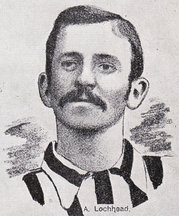
It was a sorry end to an epic Scottish Cup clash between two of Scotland's strongest sides, Third Lanark and Abercorn, who met in the fifth round of the cup. Thirds won 5-4 on 24 November but the Paisley side protested to the SFA that the game had finished in darkness, and were granted a replay. On 8 December the sides drew 2-2, and a week later it was again 2-2. The tie therefore went to a fourth match, played at neutral Ibrox on 22 December. This time Thirds came out on top, winning 3-1, but the notable feature of the game came just before the end, described in the press as 'a somewhat unseemly incident':
Lochhead of the Volunteers and Buchanan of the Abercorn engaged in a stand-up fight, the result being one black eye in favour of the Third man. Buchanan expressed great annoyance at his 'facial decoration', remarking that it looked bad at this season of the year. For that little bit of by-play - which was very much appreciated by a portion of the crowd - both players were ordered off the field, and in all probability will be suspended by the Association on Tuesday evening.
Astonishingly enough, there was indeed an SFA meeting on Tuesday, Christmas Day, although 'there was a general regret that the members should have been called together on Christmas night, and an attempt was made to get through the business quickly'. A variety of business included the disciplinary issue of the cup-tie: Buchanan and Lochhead, who indulged in a 'free fight' last Saturday in the match, Abercorn v Third Lanark, were suspended for a month. The latter wrote apologising and, though the Association thanked him for his letter, they were sorry to come to the conclusion that he ought to be punished in the manner described.
That was not the end of their troubles, by any means. In a rare intervention by the courts into football business, the two players appeared in Govan Magistrates Court on 28 December: Robert Buchanan, residing in Greenock, and a member of the Paisley Abercorn Football Club, and Alexander Lochhead, a member of the Third Lanark Club, were charged at Govan with fighting with each other during a football match, which was witnessed by 5,000 persons. The Magistrate said the public went to see football and not fights, and fined Buchanan 2 guineas, or thirty days, and Lochhead 30s, or twenty days.
Presumably both players paid up rather than go to prison, but despite the shame and financial loss, it all ended well. Alex Lochhead (pictured above) was back in the Third Lanark side by the time they won the Scottish Cup in February 1889, defeating an upstart new club called Celtic in the final. And in April, having been forgiven by the SFA, he was capped for Scotland against Wales. Robert Buchanan also came good, and he too won a Scotland cap against Wales, scoring one of the goals in a 4-3 victory in 1891.
In these days when the SFA boasts of its Fast Track Tribunals to deal swiftly with players who step out of line, it is worth remembering that in the Victorian era their officials would happily give up their Christmas dinner to see that justice was done.
 RSS Feed
RSS Feed